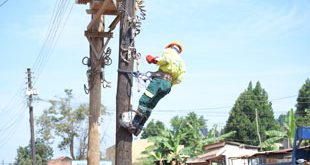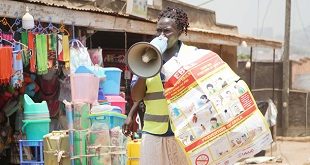
By Morris DC Komakech
People here have to come to a convergence that their primary source of wealth is the soil under their feet
On April 16 2014 we drove through Pader Town Council to Lapeta central, Lanyirinyiri Parish in Lira Palwo, Agago District to bury Mzee Obaldo Opogo who succumbed to recurrent tuberculosis.
Mzee Obaldo was 83 years old, having been born in 1931. He was married to two wives and was blessed in his life with 11 children and 36 grandchildren. Considering the tumultuous times that Acholi has passed through, Mzee Obaldo’s death was a loss to the community, but his life deserved a celebration, not mourning.
He lived a successful life in procreation and in life as a talented sportsman and traditional dancer. He left unceremoniously for an elder who is a valuable source of life lessons for the youths who are dying at tender age these days.
As we drove past Pader Town Council headquarters, my admiration for this town planner could not be hidden. Pader, like other Acholi districts of Agago, Kitgum and Lamwo have very attractive landscape. They all appear to be sitting in this beautiful green saucer hemmed in by C- shaped mountain ranges that stretch as far as Abim and zigzag to Lamwo through Kalongo, Latanya Agoro, and others.
The scenic view offered by this blend of nature offers much potential for economic transformation. These mountain ranges, if well exploited can become serious sites of tourist attraction.
I am certain that there are mysteries and history to these mountain ranges. One obvious observation is the preserved forests on the mountains in comparison to the shrubs and thorns in the plain land. In Agoro and Lokung, the human settlement in villages littered at the foothills of the mountain proves that the fertile soil around these mountains can sustain livelihood. Usually other mountainous places offer very poor quality of soil and granite which does not support food crop.
But death in Acholi land is still very rampant. Not one week passes without hearing about death – either natural or senseless murders in villages. It appears that Acholi land is hungry for human flesh because the land is not being fully utilised to improve life.
Acholi land is arable land which can sustain mechanised and modern farming. People here have to come to a convergence that their primary source of wealth is the soil under their feet. According field extension specialist, Simon Ojok Odoch and Food for the Hungry – Kitgum manager, Seydou Adolatona, Mzee Obaldo was a prominent beneficiary of Food for the Hungry’s livelihood programs while still living in IDP camp in Lira Palwo Subcounty from 2006-2008.
Farming is popular here and yields have not been bad in the previous farming season according to villagers I spoke to in Pajule, Acholibur, and Awere. The problem is reliable market for the produce and once disposed, how to plan to use to proceeds to meet basic household needs. Many people would rather buy alcohol than clothes and shoes for their school age children. Schools are charging PTA and other expenses at a meager cost of Shs5000 – 10000 which many of the farming communities here can easily afford.
I have gone to homes where children are staying home because their parents have not paid school dues of Shs10,000 (Approx. US$4) for primary school and Shs 50,000 (Approx. US$20) for secondary school per three month term.
This is upsetting because you find in such homes there are chicken, goats, cows, pigs, sheep etcetera loitering about. The current market price of chicken is about Shs15,000 which could place three children in primary school. The current market price of a mature goat is Shs 80,000 – 90,000 which can put two children through secondary school. The market for pork is insatiable in restaurants and pork joints, and yet the supply is painfully sluggish.
These contradictions bring to mind one question. Are we valuing the education of our children or do we value keeping animals at home? I believe that on the average, most families here can put their children through primary and secondary school under the UPE/USE. Emphasis on livelihood and household income generation has been made and responses are good. What remains prudent is to alter the mindset to encourage purposive investment in food production for education. Each child should be tasked with the responsibility of tending to his/her animals or field to ensure that they stay in school.
The addiction created by NGO culture of donation and offering free supplies must be suppressed so that people can become self-reliant to live longer like Mzee Obaldo. I end this piece by encouraging clan chiefs and leaders to attend urgently to the problem of alcoholism in northern Uganda.
Morris Komakech is a social critic and political analyst based in Toronto, Canada, currently visiting Pader, Kitgum, Agago and Lamwo districts of northern Uganda.
Contact: mordust_26@yahoo.ca
 The Independent Uganda: You get the Truth we Pay the Price
The Independent Uganda: You get the Truth we Pay the Price



